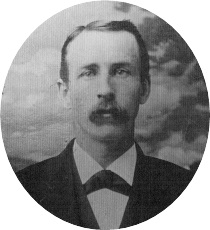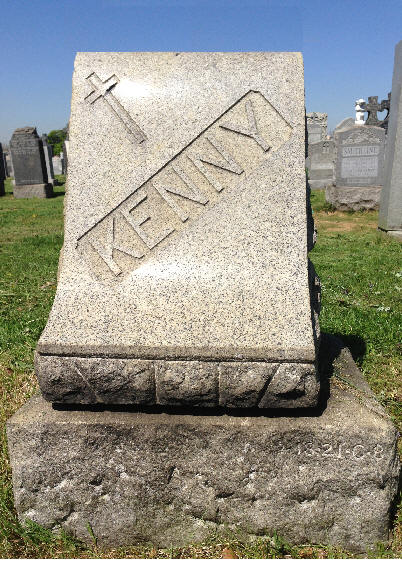John Kenny (1847 - 1924)
Irish patriot, Fenian, Land League activist, Clan na Gael envoy, President of Clan na Gael,
Writer, and a valued friend and supporter of Cumann na mBan
 John Kenny was born in
Branganstown, Co. Kildare in
1847. After spending a few
years in Australia, he arrived
in New York around 1870, where
he joined Clan-na-Gael, the
secretive Irish-American
organization associated with the
Irish Republican Brotherhood. He
rose quickly through the ranks
and by the early 1880s was the
president of the New York
Clan-na-Gael.
John Devoy (whom
Pearse called “the greatest of
the Fenians) and
Thomas Clarke,
later arrested and imprisoned on
an attempted bombing mission in
London, were among the members.
John Kenny was born in
Branganstown, Co. Kildare in
1847. After spending a few
years in Australia, he arrived
in New York around 1870, where
he joined Clan-na-Gael, the
secretive Irish-American
organization associated with the
Irish Republican Brotherhood. He
rose quickly through the ranks
and by the early 1880s was the
president of the New York
Clan-na-Gael.
John Devoy (whom
Pearse called “the greatest of
the Fenians) and
Thomas Clarke,
later arrested and imprisoned on
an attempted bombing mission in
London, were among the members.
In 1885, John left a very
successful business in New York
to bring his family back to
Ireland, renting The Mount, a
horse farm in Kilcock, Co.
Kildare. There, while playing
the part of a gentleman farmer,
he ran high-level meetings and
laundered funds coming in from
America. His young daughter
Margaret would be sent through
town carrying a cake to a
neighbor’s house as a signal
that a meeting was to be held
that night. The children were
strictly warned never to speak
of anything or anyone they saw
at The Mount. John and his wife
Annie worried they may have
carried things too far when
their youngest daughter
Josephine, asked by a kindly
neighbor “And how old are you?”
answered “I really don’t think
that’s any of your business.”
Despite evident surveillance by
G-men, the children enjoyed
their years in Kilcock - but the
stress took its toll on John’s
marriage. In 1890, the family
moved back to New York. John
and Annie separated, the
children were sent to boarding
schools in America and John
returned to Ireland – first to
Naas and later Dublin, where he
continued his revolutionary
work. His frequent trips between
Ireland and America served as a
cover for his role as the
Clan-na-Gael/IRB liaison.
Tom Clarke, released in 1898 after fifteen brutal years in prison, found his way back to New York, eventually serving as Business Manager on John Devoy’s newspaper The Gaelic American. Clarke returned to Dublin in 1907 to prepare the way for rebellion; John, who had returned to New York, took Clarke’s place as the newspaper’s Business Manager. By 1914, John was once again the president of the New York Clan-na-Gael, as well as the Vice President of the I.R.B. Veterans Association, and a founding member of the provisional committee formed to arm the Irish National Volunteers, as well as a member of many other Irish organizations.
On August 4, 1914 Great Britain declared war on Germany. Under John Devoy and Roger Casement, the top Clan-na-Gael officials in New York arranged a meeting with the German Ambassador to the US. They presented their plan to the Germans: if the Germans would sell them guns and provide military leaders, the Irish would start an uprising in Ireland, thus putting England at war on two fronts. Casement and Devoy, anxious to present their case themselves but unable to travel, sent an envoy to Europe. They chose John.
John sailed on August 14, landing in Naples. After finally getting permission to land on the condition that he proceed directly to Switzerland, John slipped into Rome. Finding the German embassy, he was surprised when his credentials gained him immediate entrance and a lengthy interview with Ambassador Count von Flutow. Von Flutow read the Clan-na-Gael’s proposal and questioned him extensively about it. At the end of their meeting, von Flutow called Berlin on John's behalf, and issued him an Imperial Pass to facilitate his travel through Germany.
For the next ten days, John
crisscrossed Europe in the midst
of the mobilization of millions
of men. The Imperial pass
allowed him to ride on troop
trains, where he was often the
only civilian. The rest of the
time, he walked, foraged for
food, and slept outdoors when
necessary. He recalled his
difficult years in Australia
fifty years earlier as good
training for this mission. While
never quite catching up with the
Kaiser, he did meet in Berlin
with the ex-Chancellor Prince
von Beulow, who also read the
proposal. He offered to help
John reach the Kaiser but John,
seeing that his return through
Naples had been cut off by the
war, decided he had accomplished
his mission. Von Beulow warned
him against heading for Ireland,
which would require travel
through England where capture
“might mean the 'Tower' with
unpleasant possibilities.”
Nonetheless, when John arrived
in Rotterdam to learn he had
missed by several hours the ship
for New York, he headed over to
Ireland. There he met with his
old friends Tom Clarke and
Patrick Pearse, as well as Sean
MacDermott, and updated them on
his mission which until then was
known only to Devoy and
Casement.
Arriving back in New York six
weeks after he had left, John
lunched with Casement, who was
enthusiastic – boyishly so,
thought John – about the success
of the trip. Casement would
leave in a few days on his own
trip to Germany. Captured by the
British while trying to bring
the German guns into Ireland, Roger Casement would be
hanged in London on August 3,
1916.
On November 14, John again
sailed – this time for Ireland,
to bring the money from the
Clan-na-Gael to buy the guns.
Making it successfully through
the checkpoints in Liverpool –
much to Clarke’s and the others’
surprise - he delivered the
money to The
O’Rahilly
and
received a receipt from
MacNeill. He spent the next few
weeks meeting with and talking
to old friends, many whom he
knew as he had, as president of
the Clan-na-Gael, sponsored
their numerous US lecture and
fund-raising tours. He met with
Pearse, Clarke, The O’Rahilly,
MacDermott, MacDonagh, MacNeill,
and Plunkett, where the topics
of discussion ranged from the
political mood of the country
and its readiness for rebellion
to the best types of ammunition
and guns to purchase. When the
government suppressed the
newspapers, an imaginative
suggestion was put forth to use
a Zeppelin or airplane to
distribute bundles of leaflets
in Ireland.
John reported that contrary to
popular opinion, people’s
political leanings were not
predictable. He "found many
separatists among the so-called
garrison, many shoneens among
the workingmen, and so on.”
The day before John sailed, he
attended a meeting at James
Connolly’s relative’s house.
Maeve Cavanaugh arrived with the
news that Connolly was on the
run, having been warned of a
warrant for his arrest for an
alleged treasonable speech in
Liberty Hall the night before.
John met for the last time with
Clarke and MacDermott in Wynnes
Hotel. That evening, just before
John left for the Liverpool
boat, the O'Rahilly called to
see him on a personal matter.
That was the last John was to
see of the men of Easter Week.
Years later, John would write:
"They were the stuff of which is
made the heroes and martyrs
whose statues adorn our public
squares and whose names are
canonized in our churches. Yet
they were condemned as little
less than criminals by some who
now profess that their greatest
desire is to emulate them. They
were derided as visionaries, yet
Ireland is well on the way
towards which they would have
led.
"Within two years Dublin had risen, Ireland was aflame and continued virtually in armed rebellion until De Valera hung out the white flag."
John lived out his life in New York, still active in politics and frequently writing articles for the Gaelic American. Estranged from his wife and family, unable to return to Ireland, he was trying unsuccessfully to get into a nursing home when he died from pneumonia at age 77 on December 27, 1924. His death was reported in the headlines of the Gaelic American. His passing was mourned by the many Irish organizations in the city, and a special Mass was said in his honor for all the Irish societies, sponsored by the Cummann na mBan. Among the many letters of sympathy printed in the newspaper for several weeks after his death, was the Cummann na mBan’s:
"The organization feels that in the death of John Kenny they have lost one of their most valued friends, and one of the sincerest, noblest, and most intelligent friends of Ireland who was ever ready to assist wholeheartedly and unselfishly; ...a soul that never valued the material things of this world."
Contributed by Fran Christ
Cemetery AND grave location
Name: Calvary Cemetery
ADDRESS: 49-02 Laurel Hill Blvd, Flushing, NY 11377
Section - 18, Range - 21, Plot - G, Grave - 8
GRAVE

Photo courtesy John McDonagh

